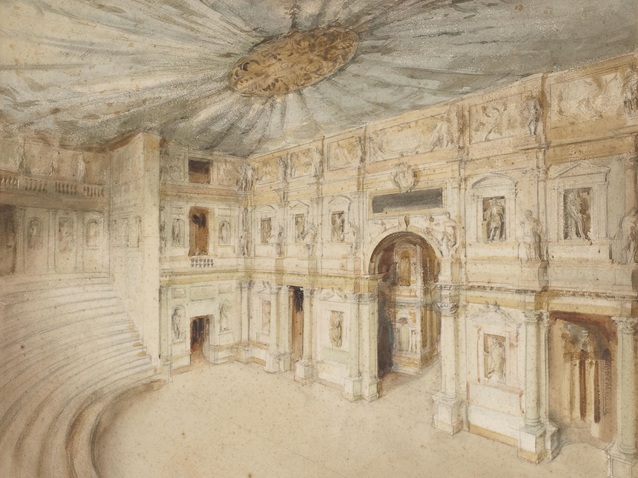 © Anonymous
© Anonymous
It is always magic and miracolous to enter the 'Teatro Olimpico' in Vicenza. Built by the world famous architect Andrea Palladio in the shape of an antique Greek amphitheatre in the 16th century, it is now the home of the 'settimane musicali', a fine festival of opera and chamber music in its 24th year. It is its intimate athmosphere, the very personal service and the unforgetable ambience and the extraordinary acoustics of the location which make it a prestigous event for music lovers.
The small team around artistic director Giovanni Battista Rigon is highly motivated, talented and ambitious to further enlarge the variety of spectacles and to create an international reputable festival next to limited financial sources. This years opera production of Wolfgang Amadeus Mozart's grand drama giocoso Don Giovanni is once more a remarkable proof of their efforts. Lorenzo Regazzo has signed up again for the direction together with his team : Claudio Cervelli for the light design and Maria Elena Cotti for the stage design and costumes. There are limited possibilities for stage design on the historic stage, so it is all more symbolic and fragmentic of a contemporary setting. We are at Don Giovanni's home, a turnable red leather chair in front of a flatscreen TV, all on a podest overlooking the stage. And then the most famous historic playboy next to Casanova appears on stage. It is the characterisation by the director, partly overemphasized, which cleverly sets a new image on the story. Don Giovanni is a young, pampered teen, fully under the educational power of the well aged servant Leporello, who shares and lives with Don Giovanni his own unfulfilled desires and wishes. It is Leporello who takes the lead and omnipresently pushes the story. Being in Italy, all of the participants are even in their casual extraordinary dresses, presenting their bella figura choir competing with a model casting show on TV. There is life and action on stage and everything feels realistic, gestures and movements are copied from the modern streetlife.
The young singers do all fit in their roles. Luca Dall'amico (who is born in Vicenza) is goodlooking, a typical Italian youngster with a shaved head, always cool and full of gestures. Brilliant, his appearence on stage with a Roman style metal chest uniform, just like all the statues around the stage and the theatre, imitating their postures or even competing with their majestic outlook. His voice lacks some warm timbre but the youth in his characterisations does not need it. Giovanni Furlanetto marks a typical elegant southern gentleman, fulfilling his minor work with the necessary mixture of correctness and disgust. He is more than relieved once Don Giovanni gets his punishment and finishes the purgatory by kiling his young master. Anna Viola is a dramatic Donna Anna with a hard voice without sufficent differentiation. The buisy and overactive character of Donna Elvira is well transformed by Arianna Venditelli. With her big and powerful voice, she wins an even more dominant presence. Matteo Macchioni is a very tender and gentle tenor. Thanks to the choice of the Viennese version of the opera, we can hear the famous arias which contributed to his role in a splendid presentation. Abramo Rosalen was chosen to sing the role of the Commendatore as well as Masetto, a fact which is due to the first performance of the opera in Vienna, and documents the original vicinity of the two men. Minni Diodati rounds up the well and harmonious selected voices as a fine soprano for Zerlina.
Giovanni Battista Rigon has the right sense and sensitive feeling for the fragile but as well voluminous music of Mozart. He guides his small but very concentrated orchestra in well defined tempi. It is andante ma non tropo allegro and sempre vivace. It is the right cocktail of drama, lyric and poetic ingredients spiced by the colour of voices and instruments. The sound is embedded in a dry transparent envelopp by the intimacy of the small theatre with its metallic clear acoustic. So the evening passes by quickly well entertaining eyes and ears. The audience of the totally sold out theatre sitting close next to each other spends a very warm and hearty applause with specials honors to the maestro and the director, motivating them for the production of Le Nozze di Figaro to come next year. An opportunity to come back for a new encounter.
Helmut Pitsch
the 27 of May, 2015 | Print
Comments